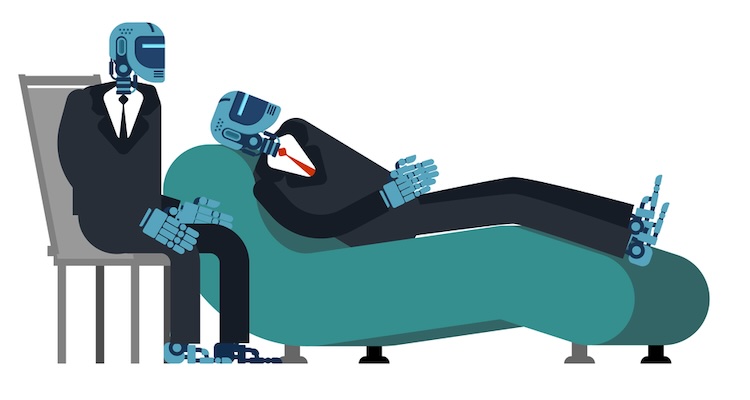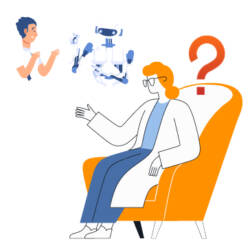Sexuality Experts Speculate on the Future of Love and Desire
How we may live to see human sexuality utterly transformed

For the newest installment in our ongoing Future of Sex Expert Series, we asked three exceptionally skilled and professionally respected sex therapists, researchers, and sexologists to offer their opinions on the question, “In what surprising new ways might human sexuality evolve in the coming years?”
Dr. Amy Marsh—clinical sexologist, AASECT-certified sexuality counselor, certified hypnotist and hypnosis instructor
“Human beings can and do eroticize anything and everything, and as long as things are adult and consensual, there should be no problem. Period. What’s needed is not so much an evolution in human sexuality—because the bandwidth of human sexual behavior (and gender identities and expression) is already so very broad and has been for eons—but a worldwide understanding and acceptance of its breadth and depth, as well as a greater social and cultural understanding and emphasis on the importance of pleasure in sexual health and general wellbeing.
“I want to see movements resulting in a near-utopian sea change in our attitudes toward sexuality (including asexuality). I’d like to see education, social structures, policies, media, and more, reflect this understanding and for sexual and gender human rights to take center stage.
“This can include tech innovations, like AI and robot companions that should become available for all who need them, as well as greater acceptance of what we call sexual and gender minorities and outliers.
“We need adjustments to our attitudes toward aging and disabled sexuality. We need an end to shame and guilt. We need an end to moral panics. We need a solid commitment to never, ever criminalize or prevent personal autonomy in health care decisions ever again.”
Gloria Brame—Ph.D. sex therapist, board-certified sexologist
“The future will bring increasing normalization of creative and once-marginalized sex. Formerly forbidden dialogues are now acceptable, particularly among younger people. Overall, people under 40 are far less judgmental than previous generations about other peoples’ interests and orientations. This includes but isn’t limited to anal sex, kinks, fetishes, LGBTQ sex, polyamory, sex work, and porn. Today, hundreds of millions of people began viewing porn as adolescents and continue to enjoy it in adulthood. In my therapy practice, shame-centered dysfunctions have been declining. Instead, there is a thirst for learning how to have more and better sex. People under 40 are inclined to embrace creative paths to greater sexual fulfillment.
“They read sex studies, watch porn, and fill in the gaps in their sex education by keeping up to date on how to navigate consensual relationships and stay healthy. Adult entertainment industries—from porn providers to shopping platforms that sell an almost unfathomable range of sex toys and gear—are booming. Offline, the medical establishment is busily offering new treatments for sex-related problems and encouraging doctors to talk about sex to patients. The ubiquity of sex-positive education online and on campuses has also played a key role in normalizing once-taboo subjects. This is a remarkable departure from previous generations who lacked access to sex-positive information and, thus, adhered to ideological models of how sex was supposed to work.
“So the Internet has been a driving force in culture’s sexual evolution. And, as long as the Internet continues to provide such content, we should expect to see new generations who are free of the inhibitions and sexual neuroses that haunted previous generations. That said, corporations and politicians alike keep fighting back against these advances. The worst-case scenario for the future of sex is that censorship could bring that evolution to a stop. History clearly shows that humanity cycles through periods of sexual freedom followed by periods of repression and criminalization of sex. The overturn of Roe v. Wade is a glaring example of how swiftly a small handful of anti-sex actors destroyed reproductive rights in the U.S. As much as has been achieved in the last 30 years, we must remain prepared to fight the institutions that want to turn the clock back on other sex and gender-related human rights.”
Markie L. C. Twist—Ph.D., LMFT, LMHC, CSE-S, RegCOSRT
“I think as technology grows and changes our relationships with it and each other will continue to grow and change and that includes sexually and intimately. I think as more dating and chat-based apps, intentionally include more options with machine-learning artificial intelligence (AI) to interact with folx intentionally in ways that approximate chatting with human/organic partners, I think we will see more people feeling digiattachment connections and relationships with technology/synthetics. I think as sex/companion dolls and robots continue to advance, and also as older models decrease in price, I think we may learn of more people having these kinds of organic-synthetic relationships.
“Summed up, all of this basically indicates an ongoing rise in digisexuality, particularly as people are reportedly more lonely, we have an aging Boomer generation, and younger generations are delaying first time in real life human-human sexual encounters, having fewer human sexual partners on average, and also remaining single from human partners more often and longer than in previous generations. I do also think we remain a very long way off from a synthetic partner, whether an it’s AI chat one or robot-based one, being sentient and thus actually being in a mutually consensual and loving relationship with us, but I do think we are in a space where more organics/humans can, do, and will feel deeper attachment bonding and affection for synthetics/technology in the near future.”
Image Sources: Depositphotos

















